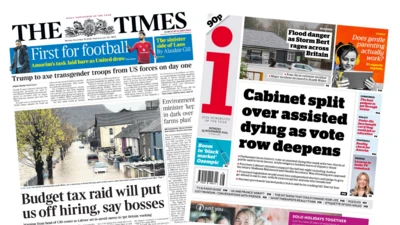We've updated our Privacy and Cookies Policy
We've made some important changes to our Privacy and Cookies Policy and we want you to know what this means for you and your data.
Data and the threat to democracy
Image source, Getty Images
- Author, Amol Rajan
- Role, Media editor
Is our personal data safe? And might it be used by individuals, companies or governments to influence the democratic process?
These are the two fundamental questions at the heart of the revelation that 50 million Facebook users allegedly had their personal data harvested by Cambridge Analytica, following investigations by Channel 4 News, The Observer and The New York Times.
If the answers are "no" and "yes" respectively, as all the early evidence appears to indicate, the implications are immense.
This story is given oomph by the question of who knew what and when. Alexander Nix, the CEO of Cambridge Analytica has been accused of deliberately misleading a parliamentary Select Committee. He denies the allegation. Chris Wylie, the Canadian whistle-blower, has said that Facebook about the scale of the data breach two years ago. While he claims tens of millions of users have been targeted, the company, which denies any wrongdoing, says it did not harvest Facebook data. They cannot both be right.
The deeper currents behind the story are economic and political, and relate to the way in which the internet has made data the most valuable commodity of our time.
I have written elsewhere that data is not the new oil. But there is no doubt that economic history has reached a point where the owners of vast troves of data, most of it given to them by unthinking consumers, are the corporate titans of the age. This is a vast over-simplification, but in the transition from an agrarian, to an industrial, to a knowledge and service economy, and now to a data economy, we have seen the emergence of what some top economists call .
It isn't hard objects - material stuff - that has made the likes of Facebook extremely rich. It is personal data. Of course we have a mixed economy, with different sectors attaining growth and wealth in different ways.
But have acquired unprecedented wealth and power through their use of the personal data we give them each time we use their services. One aspect of this phenomenon that doesn't get the attention it deserves is that, compared to the corporate titans of the past, these superstar firms don't actually employ many people.
The other aspect that is coming to light is that there is so much data, and it is so capable of being scraped by smart computer geeks, that it may not be safe. This - perhaps more than the spread of fake news and disinformation - is the sense in which Facebook has unleashed something it may not be able to fully control.
It is almost funny how Facebook has denied this is a data "breach". The company says it granted Aleksandre Kogan, the Cambridge academic, permission to access information, but that in sharing it with Nix's firm and allowing it to be used for commercial purposes, he broke the terms of the licence. Facebook has now suspended the company and Wylie from their social media platform.
In their statement, they say: "People knowingly provided their information, no systems were infiltrated and no passwords or sensitive pieces of information were stolen or hacked." Even if all that is true, it displays a tin ear for public sentiment. The company says it learned about the issue in 2015 and removed Kogan's app while adding the data should be destroyed. This, it seems, wasn't complied with.
Call it a breach, hack, theft, robbery, harvesting or plain old profiling, what is going on is simple. In under a decade-and-a-half, Facebook has acquired a market capitalisation of over half a trillion dollars by providing an excellent free service. In return for this free service, it uses our personal data to let advertisers target us with messages. With over two billion users, each of them leaving a digital trail with every like, click, share and post, that's a lot of data. Data is hard to control at the best of times. At this volume, it can end in places it shouldn't.
The old saying that "if it's free online, you are the product", has merit. In effect, Facebook's free service, which no human being, company or institution is compelled to use, is a mass surveillance tool. There are very legitimate fears among the public about the safety of their data. This story, whose force derives in part from the fact that the main actors have denied wrongdoing throughout, will heighten such fears.
And then there is the question of its impact on our polity and politics. Cambridge Analytica have denied doing any work on the Brexit referendum. And while it is true that Nix saw the Republican Party as a great opportunity, has links to Breitbart through his board, and was funded by Robert Mercer, the libertarian supporter of Donald Trump, this isn't really a left v right issue.
President Obama's team used Facebook to target voters a decade ago, albeit with different techniques (and no suggestion of wrongdoing). A Cambridge Analytica employee has in the past told me that his company works for liberals around the world too.
But there are important laws and regulations preventing interference in democratic politics. The Information Commissioner in the UK is examining what role if any the company had in the Brexit referendum. In the US, it is possible that the company acted within the letter and even the spirit of the law - though many will debate the matter. And it may be the case that the influence of this company is much overblown.
That companies are using our digital footprints to harvest data and target us for commercial or political purposes should, however, prompt deeper consideration of the implicit contract between consumers and technology companies.
A new era is upon us, in which the data of masses have made a few firms massively rich. The masses need to think harder about what that means for them.
Top Stories
More to explore
Most read
Content is not available








